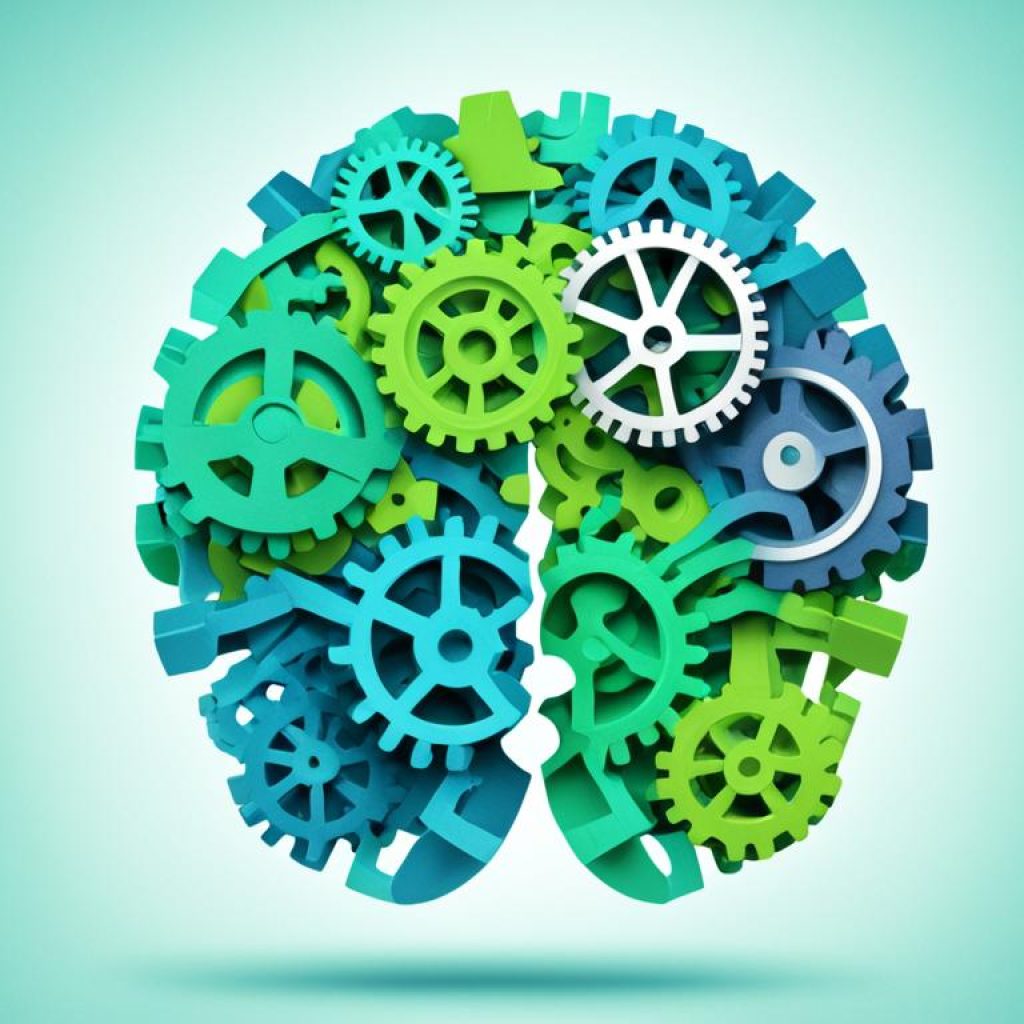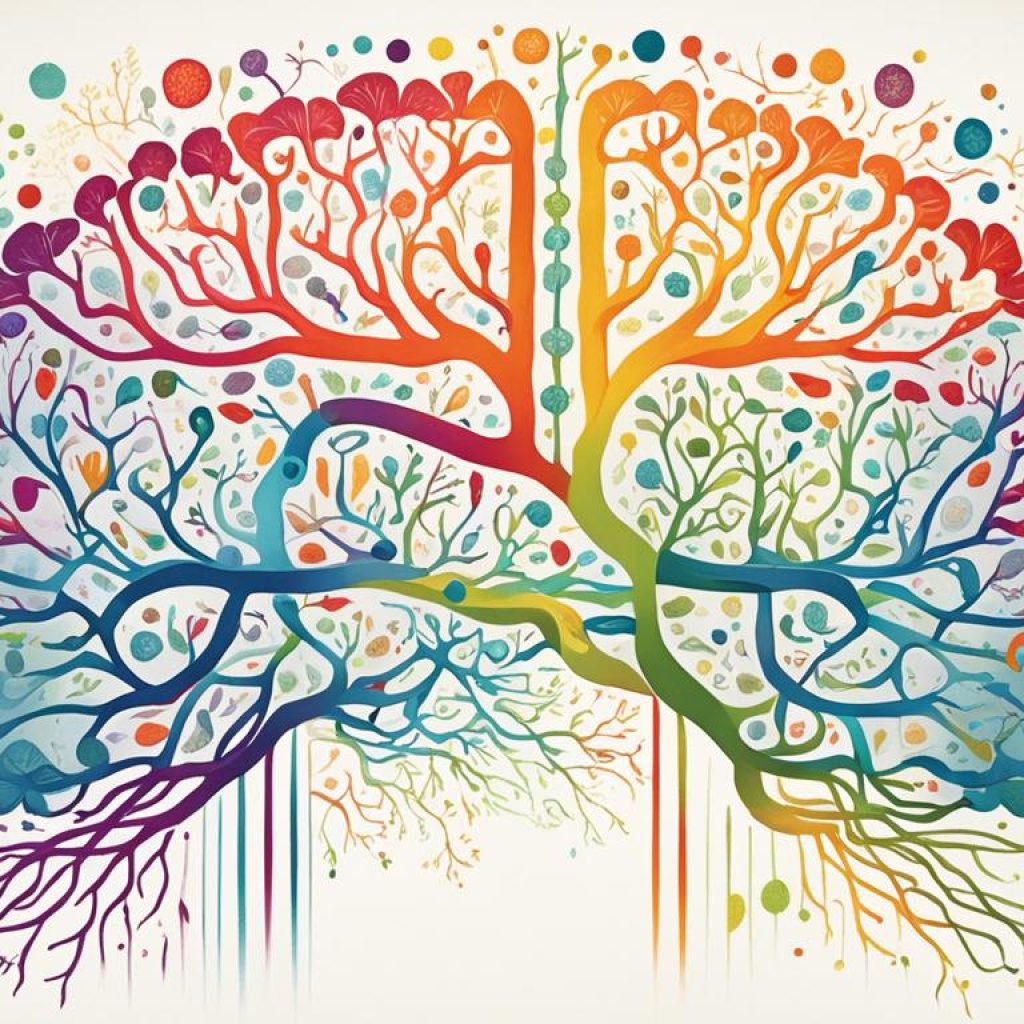In today’s fast-paced and demanding world, stress has become an all-too-common companion. It’s easy to think that our stress is caused solely by external factors such as work pressure or personal responsibilities. However, what if there are hidden stress triggers within us that we are unaware of? This is where a mind-body approach comes in, offering a transformative path to stress management and relief.
By recognizing the deep connection between our thoughts, emotions, and physical sensations, we can uncover hidden stress triggers that contribute to our daily stress levels. This understanding empowers us to adopt effective strategies and techniques to cope with stress, reduce its impact on our lives, and improve our overall well-being.
Key Takeaways:
- Stress has both external and hidden triggers that contribute to its impact on our lives.
- A mind-body approach explores the interconnectedness of our thoughts, emotions, and physical sensations in managing and reducing stress.
- Recognizing hidden stress triggers provides the foundation for adopting effective stress management techniques.
- By embracing a mind-body approach, you can achieve greater awareness of stress triggers in your daily life and develop effective stress prevention strategies.
- Reducing stress levels requires a holistic understanding of the mind-body connection and the proactive implementation of stress relief tips.
The Power of a Mind-Body Approach
A mind-body approach is a transformative approach to holistic healing that recognizes the interconnectedness of our mental, emotional, and physical well-being. Rather than viewing the mind and body as separate entities, this approach embraces their profound connection and seeks to establish harmony between the two.
By adopting a mind-body approach, individuals can address the root causes of stress and anxiety, leading to improved mental and physical well-being. This integrative approach combines relaxation techniques, self-awareness, and mindfulness practices to promote balance and healing.
The Mind-Body Connection and Holistic Healing
Our mental and emotional states can significantly impact our physical well-being. Stress and anxiety, if left unmanaged, can manifest as a variety of physical symptoms including headaches, muscle tension, digestive issues, and chronic pain.
A mind-body approach offers holistic healing by addressing the mind, body, and spirit simultaneously. It emphasizes the importance of self-care, stress reduction, and emotional well-being to achieve optimal health.
One of the ways a mind-body approach can heal physical symptoms is by reducing the body’s stress response. When we experience stress, our nervous system undergoes physiological changes that can contribute to physical discomfort. By engaging in relaxation techniques, such as deep breathing exercises, meditation, and yoga, we can activate the body’s natural relaxation response and promote healing.
A holistic healing approach also encourages individuals to become more self-aware and mindful of their thoughts, emotions, and physical sensations. This heightened sense of awareness allows us to recognize the early signs of stress and anxiety, enabling us to intervene before they have a detrimental impact on our well-being.
Healing Headaches, Muscle Tension, and Digestive Issues
A mind-body approach can be particularly effective in healing physical symptoms associated with stress and anxiety. Through the integration of relaxation techniques and mindfulness practices, individuals can find relief from conditions such as headaches, muscle tension, and digestive issues.
| Physical Symptoms | Mind-Body Healing Techniques |
|---|---|
| Headaches | Deep breathing exercises, mindfulness meditation |
| Muscle Tension | Yoga, progressive muscle relaxation |
| Digestive Issues | Gentle exercises, dietary modifications, stress reduction |
By incorporating these mind-body healing techniques into their daily lives, individuals can experience relief from physical symptoms while also addressing the underlying stress and anxiety.
Image Caption: Holistic healing encompasses the mind, body, and spirit, promoting overall well-being and balance.
The Mind-Body Connection: Breaking the Myth
Contrary to common belief, our minds are not isolated from our bodies. They are constantly communicating and influencing one another. Emotions, thoughts, and physical sensations impact our overall well-being. By recognizing this connection, we can embrace relaxation techniques, such as deep breathing, meditation, and yoga, to calm the nervous system and bring peace to the mind.
The mind-body connection highlights the interconnected nature of the brain and body. Our mental well-being is intrinsically linked to our physical state, and vice versa. When we experience stress or anxiety, it can manifest as both emotional turmoil and physical symptoms. However, by understanding and nurturing this connection, we can cultivate a sense of harmony and well-being.
Relaxation techniques play a significant role in strengthening the mind-body connection. Deep breathing exercises, for instance, help activate the body’s relaxation response, reducing stress and promoting mental clarity. Meditation allows us to tune into our physical and emotional sensations, fostering self-awareness and mindfulness. Yoga combines physical movement with breath control, promoting physical flexibility, emotional balance, and mental well-being.
| Relaxation Techniques | Benefits |
|---|---|
| Deep Breathing | Calms the nervous system, reduces stress, and promotes mental clarity |
| Meditation | Fosters self-awareness, mindfulness, and emotional balance |
| Yoga | Combines physical movement and breath control, promoting flexibility and mental well-being |
By incorporating these relaxation techniques into our daily lives, we can improve the mind-body connection and enhance our overall well-being. The practice of deep breathing, meditation, and yoga not only helps alleviate stress and anxiety but also develops resilience and provides a foundation for mental and physical wellness.
The mind and body are not two separate entities, but rather an interconnected system working in unison. Through relaxation techniques, we can bridge the gap between our emotions and physical sensations, promoting harmony and cultivating a profound sense of well-being.
Healing Physical Symptoms of Stress & Anxiety
Chronic stress and anxiety can take a toll on both our mental and physical well-being. In fact, they often manifest in a variety of physical symptoms, which can include headaches, muscle tension, digestive issues, and chronic pain. The mind-body approach offers a powerful solution, empowering individuals to address both the root causes of stress and anxiety and their physical manifestations.
By incorporating relaxation techniques, mindfulness, and self-compassion into our daily routines, we can alleviate tension and achieve a calmer state of being. These practices not only provide temporary relief but also cultivate a deeper sense of self-awareness and resilience in the face of stressors. Let’s explore some effective relaxation techniques that can help in healing the physical symptoms of stress and anxiety.
Relaxation Techniques for Stress & Anxiety Relief
1. Deep Breathing: Deep breathing exercises help activate the body’s relaxation response, reducing stress and promoting a sense of calm. Take slow, deep breaths, filling the belly with each inhalation and exhaling fully.
2. Mindfulness Meditation: Engaging in mindfulness meditation can help quiet the mind and bring attention to the present moment. Focus on your breath, bodily sensations, or a specific object of focus, allowing thoughts to pass without judgment.
3. Yoga: Practicing yoga combines physical movement with breath control and mindfulness, promoting strength, flexibility, and relaxation. It can help release tension held in the body and calm the mind.
4. Progressive Muscle Relaxation: This technique involves tensing and releasing different muscle groups to promote relaxation and reduce muscle tension. Start with your toes and work your way up to your head, consciously relaxing each muscle group along the way.
5. Self-Compassion: Being kind and understanding towards ourselves is essential in managing stress and anxiety. Practice self-compassion by acknowledging your feelings without judgment and offering yourself words of comfort and support.
Remember, these techniques are not just quick fixes but tools that can support a holistic approach to well-being. By incorporating them into your daily routine, you can proactively address the physical manifestations of stress and anxiety, promoting a healthier and more balanced life.

The Impact of Relaxation Techniques on Physical Symptoms
| Physical Symptoms | Relaxation Techniques |
|---|---|
| Headaches | Deep breathing, mindfulness meditation |
| Muscle tension | Progressive muscle relaxation, yoga |
| Digestive issues | Deep breathing, self-compassion |
| Chronic pain | Yoga, mindfulness meditation |
As the table demonstrates, different relaxation techniques can have specific benefits for relieving physical symptoms associated with chronic stress and anxiety. While deep breathing and mindfulness meditation can help alleviate headaches, progressive muscle relaxation and yoga are effective in reducing muscle tension. Additionally, deep breathing and self-compassion practices can support digestive issues, and yoga and mindfulness meditation techniques can help manage chronic pain.
By nurturing a mind-body connection through these techniques, individuals can take proactive steps towards healing physical symptoms and achieving a state of greater well-being. The integration of relaxation techniques, mindfulness, and self-compassion provides a holistic approach that addresses both the mind and the body, enabling individuals to effectively manage stress and anxiety while promoting overall health and balance.
Calming the Nervous System for Inner Tranquility
The nervous system is an intricate network of cells and nerves that plays a crucial role in our body’s stress response. When faced with stressful situations, our nervous system releases hormones that trigger a cascade of physical and emotional reactions. However, prolonged stress can lead to an overactive state, resulting in an incessant stream of anxious thoughts and feelings.
To achieve inner tranquility and restore a sense of calm, it is essential to soothe the nervous system. This can be accomplished through various calming techniques that promote relaxation and mindfulness. Deep breathing exercises, meditation, and yoga are powerful practices that can effectively calm the frazzled nerves and bring about a profound sense of peace and clarity.
The Power of Deep Breathing:
Deep breathing is a simple yet potent technique that harnesses the power of the breath to calm the nervous system. By consciously taking slow, deep breaths, we activate the body’s natural relaxation response, counteracting the stress response. Deep breathing helps bring oxygen into the body, relaxing tight muscles, reducing heart rate, and lowering blood pressure. It also helps redirect attention away from anxious thoughts and fosters a grounded state of mind.
The Benefits of Meditation:
Meditation is a practice that involves training the mind to focus and redirect thoughts. By practicing meditation regularly, individuals can cultivate mental clarity, reduce stress levels, and enhance overall well-being. Research has shown that meditation has a profound impact on the nervous system, promoting relaxation, reducing anxiety, and improving emotional resilience. It allows individuals to observe their thoughts without judgment, creating space for introspection, and fostering a sense of inner tranquility.
The Serenity of Yoga:
Yoga is a mind-body practice that combines physical postures, breath control, and meditation. Its gentle and fluid movements help release tension in the body while promoting mindfulness and deep relaxation. The practice of yoga not only enhances flexibility and strength but also has a positive impact on the nervous system. Regular yoga practice has been shown to reduce stress hormones, improve sleep quality, and increase feelings of calm and well-being.
By incorporating deep breathing exercises, meditation, and yoga into our daily routines, we can actively counteract the effects of stress and anxiety on the nervous system. These calming techniques create a ripple effect, fostering a sense of tranquility that extends to our thoughts and emotions. Through these practices, we can gain a deeper understanding of ourselves, finding solace in the present moment, and nurturing our overall well-being.
Empowering Yourself Through Understanding
Knowledge is power, especially when it comes to managing our mental health and overall well-being. By deepening our understanding of how our minds and bodies work together, we gain valuable insights that can help us navigate life’s challenges with resilience and grace. Through this awareness, we can recognize patterns, identify triggers, and proactively engage in self-care and emotional regulation.
Embracing a mind-body approach is key to unlocking our fullest potential. It involves acknowledging the profound connection between our mental and physical well-being, and recognizing that nurturing both aspects is essential for holistic health. This approach encourages us to care for our minds and bodies as a unified entity, rather than separate entities that operate in isolation.
“Understanding the mind-body connection is like holding the key to our own well-being. It empowers us to take control of our mental health and adopt practices that promote self-care and emotional regulation.“
Self-care plays a fundamental role in maintaining a healthy mind-body balance. It encompasses various activities and practices that prioritize our well-being, such as engaging in activities we enjoy, setting boundaries, practicing gratitude, and maintaining healthy relationships. By making self-care a priority, we strengthen our ability to cope with stress, build resilience, and experience greater overall satisfaction in life.
Emotional regulation is another crucial aspect of a mind-body approach. It involves being in tune with our emotions, understanding their triggers, and developing healthy strategies for managing them. By learning to regulate our emotions effectively, we can navigate life’s ups and downs with greater ease and stability.
Changing Our Perspective
In order to fully embrace the mind-body approach, it’s important to change our perspective on health and well-being. Instead of viewing our mental and physical health as separate entities, we can recognize the interconnectedness between the two. When we prioritize our mental well-being, our physical health benefits, and vice versa.
By adopting a mind-body approach, we shift our focus from isolated problem-solving to a more comprehensive understanding of our own unique needs. This approach encourages us to listen to our bodies, be attuned to our emotions, and seek balance in all areas of our lives. It empowers us to make informed choices that support our mental and physical well-being.

The Power of Knowledge
Knowledge is a transformative tool in our journey toward mental and physical well-being. It equips us with the understanding and tools needed to make positive changes in our lives. Through knowledge, we gain the power to make informed decisions, cultivate healthy habits, and engage in practices that promote self-care and emotional regulation.
A mind-body approach invites us to become active participants in our own wellness journey. It empowers us to take control of our mental health and make choices that support our overall well-being. By embracing this approach, we can unlock hidden potentials, navigate life’s challenges with resilience, and experience a greater sense of fulfillment and contentment.
Functional Medicine and the Mind-Body Connection
Functional medicine recognizes the profound impact of the mind on our overall health and well-being. It understands that our thoughts, emotions, and behaviors can significantly influence our physical health, and vice versa. By integrating mind-body approaches into healthcare, functional medicine offers a holistic approach to addressing emotional and mental health, as well as physical well-being.
Unlike traditional medicine that often focuses solely on symptoms and disease management, functional medicine takes into account the individual’s unique healing process. It acknowledges that each person’s journey to wellness is different and requires personalized attention. By considering the interconnected nature of our thoughts and emotions with our physical health, functional medicine provides a more comprehensive and tailored approach to healing.
“The mindset and emotional state of an individual have a profound impact on their physical health and ability to heal.” – Dr. Sophia Anderson, Functional Medicine Practitioner
Functional medicine recognizes that physical symptoms can often be manifestations of underlying thoughts and emotions. For example, chronic stress and anxiety can manifest as physical ailments such as headaches, digestive issues, and chronic pain. By addressing the root causes of these symptoms, rather than solely treating the physical manifestations, functional medicine aims to promote true healing and restore balance to the body.

A key aspect of functional medicine is empowering individuals to take an active role in their own well-being. It encourages patients to become more aware of their thoughts, emotions, and behaviors and their impact on physical health. By fostering this self-awareness, individuals can make informed choices that support their mental well-being and overall physical health.
Benefits of Functional Medicine in Promoting Holistic Health
Functional medicine offers a multitude of benefits in promoting holistic health and well-being:
- Provides personalized care tailored to an individual’s unique healing process
- Recognizes the interconnection between thoughts, emotions, and physical health
- Promotes self-awareness and empowers individuals to take active roles in their own healing
- Addresses the root causes of physical symptoms, rather than solely managing them
- Offers a comprehensive and integrative approach to mental well-being and physical health
| Functional Medicine Approach | Traditional Medicine Approach |
|---|---|
| Focuses on holistic healing and overall well-being | Primarily focuses on symptom management |
| Takes into account the mind-body connection and the impact of thoughts and emotions on physical health | Often separates mental health and physical health as distinct entities |
| Empowers individuals to actively participate in their healing journey | Places greater emphasis on doctor-driven interventions |
| Aims to address underlying causes and promote long-term healing | Focuses more on short-term symptom relief |
Incorporating functional medicine into healthcare provides a comprehensive approach to healing that prioritizes the well-being of the whole person. By recognizing the intricate connection between thoughts, emotions, and physical health, this approach offers individuals the opportunity to achieve true healing and cultivate lasting well-being.
The Science Behind the Mind-Body Connection
Scientific research provides compelling evidence for the profound connection between the mind and body. The brain and body have a constant line of communication, with the mind playing a pivotal role in regulating bodily functions and influencing the stress response. By understanding this intricate connection, we can unlock the remarkable healing potential within ourselves.
The brain-body communication is a complex network that enables our thoughts, emotions, and physical sensations to interact harmoniously. It is through this intricate system that our well-being is deeply intertwined. When we experience stress, our body responds by releasing hormones that trigger the stress response. This response can manifest as increased heart rate, elevated blood pressure, and heightened awareness. However, the mind has the power to influence these bodily reactions, shaping our overall well-being.
“The mind has a powerful influence on the body’s response to stress. By cultivating positive emotions, such as gratitude, joy, and love, we can positively impact our immune function, reduce inflammation, and enhance overall well-being.”
Positive emotions have a profound effect on our physical health. Cultivating gratitude, joy, and love can trigger a cascade of beneficial changes within our bodies. Studies have shown that individuals who regularly express gratitude have stronger immune systems, improved cardiovascular health, and experience reduced symptoms of stress and depression. Similarly, experiencing joy and love releases endorphins and boosts the production of feel-good hormones, enhancing our overall well-being.
Gratitude, in particular, has been shown to have numerous physiological benefits. Research has demonstrated that gratitude practice can lower blood pressure, improve sleep quality, and enhance immune function. When we shift our focus to appreciate the positive aspects of our lives, we create an environment that fosters healing and resilience.
By embracing the powerful connection between the mind and body, we have the ability to influence our own well-being. Through practices that promote positive emotions, such as gratitude journals, mindfulness meditation, and acts of kindness, we can unleash the healing potential that resides within us. The mind-body connection is a gateway to holistic well-being, empowering us to lead healthier, happier lives.

| Positive Emotions | Effects on the Body |
|---|---|
| Gratitude | Enhances immune function, lowers blood pressure, improves sleep quality |
| Joy and Love | Boosts feel-good hormones, improves cardiovascular health, reduces symptoms of stress and depression |
The Role of Mind-Body Techniques in Healing
Mind-body techniques play a crucial role in fostering holistic well-being and promoting healing. These powerful practices, such as mindfulness meditation, yoga, biofeedback, relaxation techniques, cognitive behavioral therapy, and music and art therapy, offer individuals effective tools for enhancing their mental, emotional, and physical health.
By integrating these techniques into daily life, individuals can cultivate self-awareness, reduce stress and anxiety, enhance mental focus, and provide emotional expression and stress relief. Mindfulness meditation helps individuals develop present-moment awareness, promoting relaxation and decreasing the impact of negative thoughts. Yoga combines movement, breath, and mindfulness to improve flexibility, strength, and inner peace.
Yoga is the journey of the self, through the self, to the self. -Bhagavad Gita
Biofeedback empowers individuals to learn how to control their body’s responses to stress, promoting a state of calm and restoring balance. Relaxation techniques, such as deep breathing and progressive muscle relaxation, help individuals release tension and achieve a sense of relaxation and peace.
Cognitive behavioral therapy (CBT) focuses on identifying and modifying negative thought patterns and behaviors, allowing individuals to develop healthier coping mechanisms and improve their emotional well-being. Music and art therapy provide outlets for creative expression, helping individuals process emotions, reduce stress, and promote self-discovery.
The Benefits of Mind-Body Techniques
- Promotes self-awareness and present-moment focus
- Reduces stress and anxiety
- Enhances mental clarity and concentration
- Provides emotional expression and stress relief
- Helps individuals develop healthy coping mechanisms
- Fosters relaxation, calmness, and inner peace
By incorporating mind-body techniques into daily life, individuals can support the mind-body connection and promote overall healing. These practices offer a pathway to self-discovery, self-care, and improved well-being, empowering individuals to take an active role in their mental and physical health.
The Power of Integrating Mind and Body
When mind and body work in harmony, individuals can experience profound transformation and healing. The mind-body connection is a testament to the interconnectedness of our mental, emotional, and physical aspects, and by nurturing this connection, individuals can unlock their full potential for well-being and lead more fulfilling lives.
The Three Dimensions of Mind-Body Connection
The mind-body connection encompasses three vital aspects: emotional health, physical health, and spiritual health. By nurturing these dimensions collectively, individuals can achieve a more balanced and fulfilling life.
Emotional Health
Emotional well-being plays a crucial role in our overall health and vitality. It involves recognizing and managing our emotions, cultivating positive relationships, and practicing self-care.
One powerful way to enhance emotional health is through regular self-reflection and self-expression. By acknowledging and processing our emotions, we can release tension and promote inner harmony.
Furthermore, fostering positive relationships contributes to emotional well-being. Surrounding ourselves with supportive individuals who uplift and inspire us can have a profound impact on our mental state and overall happiness.
Physical Health
Physical health is an essential component of the mind-body connection. When our bodies are well-nourished, active, and cared for, it positively influences our mental well-being.
A balanced approach to physical health involves incorporating regular exercise, maintaining a nutritious diet, and prioritizing restful sleep.
Exercise not only benefits our physical body but also releases endorphins, which boost mood and reduce stress. Engaging in activities we enjoy, whether it be yoga, dancing, or hiking, can also provide a sense of fulfillment and joy.
Additionally, nourishing our bodies with wholesome foods fuels us with the energy and nutrients necessary for optimal mental and physical functioning. Prioritizing a varied diet rich in fruits, vegetables, whole grains, and lean proteins supports our well-being.
Lastly, sufficient sleep is crucial for our bodies and minds to rejuvenate and repair. Establishing healthy sleep habits and carving out dedicated rest time allows us to wake up refreshed and ready to tackle the day.
Spiritual Health
Spiritual health encompasses the connection to something greater than ourselves, whether it be religious beliefs, nature, or personal values. It involves finding meaning and purpose in life and nurturing our inner spirit.
Engaging in practices such as meditation and mindfulness cultivates spiritual well-being by fostering a sense of mindfulness and inner peace. It allows us to be present in the moment, connect with our inner selves, and tap into our intuition.
Exploring our values and aligning our actions with them contributes to spiritual health. When we live in accordance with our core beliefs, we experience greater fulfillment and a sense of purpose.
Furthermore, spending time in nature, practicing gratitude, and engaging in acts of kindness can enhance our spiritual well-being, providing a deeper connection to the world around us.
Mind-Body Principles
To foster the three dimensions of mind-body connection, incorporating mind-body principles into our daily routines is crucial.
| Exercise | Nutrition | Sleep | Meditation |
|---|---|---|---|
| Regular physical activity promotes mental and physical well-being. | Proper nutrition nourishes the body and mind, supporting overall health. | Adequate sleep allows for rejuvenation and optimal functioning. | Meditation cultivates mindfulness, relaxation, and inner peace. |
The integration of these mind-body principles aligns our emotional, physical, and spiritual health, leading to a harmonious and fulfilling life.
Conclusion
The mind-body connection is a powerful force in promoting holistic wellness and stress relief. By recognizing the interplay between our thoughts and physical sensations, embracing relaxation techniques, and nurturing our emotional, physical, and spiritual health, we can achieve a more balanced and fulfilling life. Prioritizing self-care and embracing a mind-body approach to mental health can unlock hidden stress triggers and lead to a calmer, healthier, and more resilient life.
Understanding the mind-body connection is the key to unlocking a world of well-being and self-care. By addressing stress and anxiety from a holistic perspective, we can take control of our mental health and improve our overall quality of life. Through practices like meditation, yoga, and deep breathing, we can calm the nervous system, reduce stress levels, and cultivate a sense of inner peace.
Embracing the mind-body connection also empowers us to listen to our bodies and respond to their needs. By nurturing our emotional, physical, and spiritual well-being, we can achieve a state of holistic wellness that encompasses all aspects of our being. Investing time and effort in self-care and practicing mindfulness can have profound effects on our mental health, enabling us to navigate life’s challenges with greater ease and resilience.
In conclusion, embracing the mind-body connection is a transformative journey towards achieving optimal well-being. By prioritizing self-care and nurturing our mental, emotional, and physical health, we can create a life of balance, peace, and fulfillment. Let us embrace the power of the mind-body connection and unlock the path to holistic wellness.
FAQ
What are hidden stress triggers?
Hidden stress triggers are factors that can cause stress in our daily lives but are not always obvious or easily recognized. They can include certain situations, environments, or even internal thoughts and beliefs that contribute to our stress levels.
What are some signs of stress?
Signs of stress can vary from person to person but commonly include feelings of anxiety or irritability, physical symptoms such as headaches or muscle tension, changes in sleep patterns, difficulty concentrating, and increased fatigue.
What are some stress management techniques?
There are various stress management techniques that can help reduce stress levels, such as practicing relaxation techniques like deep breathing or meditation, engaging in physical exercise, maintaining a balanced diet, getting enough sleep, and establishing healthy boundaries and self-care practices.
How can I relieve stress?
There are many ways to relieve stress, including engaging in stress-reducing activities such as yoga or other forms of exercise, practicing mindfulness and meditation, engaging in hobbies or activities you enjoy, seeking support from friends or a therapist, and prioritizing self-care activities that promote relaxation and well-being.
How can I become more aware of my stress triggers?
Becoming more aware of your stress triggers involves paying attention to your thoughts, emotions, and physical sensations when you experience stress. Keeping a journal, practicing self-reflection, and seeking feedback from others can help identify patterns and uncover hidden stress triggers.
What are some stress prevention strategies?
Stress prevention strategies include adopting healthy lifestyle habits such as regular exercise, proper nutrition, and getting enough sleep. Setting realistic goals, managing time effectively, practicing relaxation techniques, and seeking social support can also help prevent stress.

